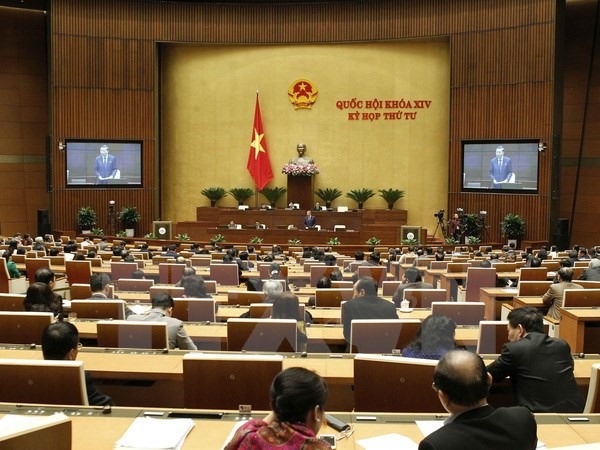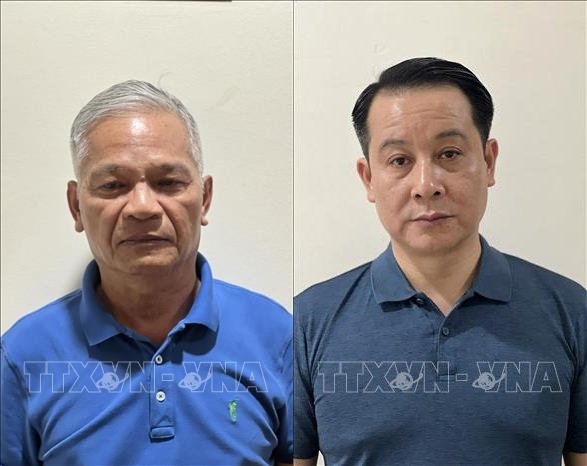 Politics & Laws
Politics & Laws

The National Assembly voted in a favour of the amended Law on Public Debt Management on November 23 during its morning session.
 |
| The National Assembly voted in a favour of the amended Law on Public Debt Management on November 23 during its morning session.— VNA/VNS Photo Văn Điệp |
HÀ NỘI — The National Assembly voted in a favour of the amended Law on Public Debt Management on November 23 during its morning session.
With 85.74 per cent of NA deputies in support of the new bill, the law will come into effect on July 1, 2018.
Numerous control mechanisms and legal frameworks were added to improve the country’s financial sustainability and marco-economic stability.
One of the highlights of the law was lawmakers’ insistence on reigning in the level of public debt. For instance, the Government will not allow its regular expenditures to be financed with loans and the transparency and accountability of public debt management agencies will be improved.
Regarding NA deputies’ concerns over the relationship between the public debt level and debts incurred by State-owned Enterprises (SOEs), the NA’s Standing Committee confirmed that SOEs are responsible for repayment of their own debts and their debts will not be classified as public debts.
In the event that SOEs are unable to meet their financial obligations, they can proceed to declare bankruptcy just like any other business.
Cyber Security
NA deputies continued with a discussion on a draft version of the law on cyber security.
Lawmakers stressed the importance of the law on cyber security, saying the law will help protect national security, social order and civil rights in the face of the increasing number of online threats.
The NA’s Committee on National Defence and Security said the law will also provide the country with a legal basis to collaborate with the international community to combat cyberterrorist acts and attacks aimed at disrupting global security and order.
Việt Nam’s cyber security is vulnerable and the country ranked 10 in a list of most attacked countries according to a report by Symantec published in May. Notably, in July 2017 the country’s flag carrier Vietnam Airlines suffered an attack on its website by hackers for more than an hour, leading to the leak of information of 400,000 customers.
Minister of Public Security Tô Lâm said the introduction of the cyber security law will provide law enforcement with the necessary legal framework to fight cyber crimes, especially in an increasingly integrated and unpredictable cyber world.
Deputy Triệu Tuấn Hải said the law will also help the judicial sector overcome shortcomings and limitations of the existing Law on Cyber Information Security and better protect national security and social order.
Deputy Nguyễn Hữu Cầu said Government agencies must step up efforts in managing online service providers to prevent potential tax losses and protect citizens’ rights in the cyber world.
He cited a clause in the new bill which dictates that service providers must maintain offices and main servers within Việt Nam’s territory.
“Internet service providers are for-profit economic enterprises. They must be treated fairly and equally just like other businesses. We are only asking for data servers for Vietnamese users to be maintained within the country. This is a practice already implemented in 14 countries around the world. Why can’t Việt Nam do it?” Cầu asked.
He noted that the measure is not to set up trade barriers or hinder investment opportunities but a necessity to protect Vietnamese citizens and the country’s national interests.
Revised law on denunciation
Later the same day, NA deputies discuss the revised Law on Denunciation, asking compiling agencies to continue studying to complete the law, focusing on main issues such as the concept and forms of denunciations and anonymous denunciations.
They also proposed adding regulations on denouncing retired officials and cadres.
Deputy Nguyễn Hữu Cầu from the central province of Nghệ An said there were many officials who were going to retire soon but still committed wrongdoings.
Deputy Phạm Văn Hòa from the Mekong Delta province of Đồng Tháp shared the same view, stressing that the law should include such regulations to prevent “retirement meaning safety or lack of punishment” among many officials.
Some deputies suggested adding more forms of denunciation, such as by fax, email or phone to make it easier for people to make denunciations and help cases get addressed in a timely fashion.
They also agreed to not accept anonymous denunciations, raising the responsibility of those who make denunciations, as well as preventing people from abusing the regulation to harm others. — VNS









